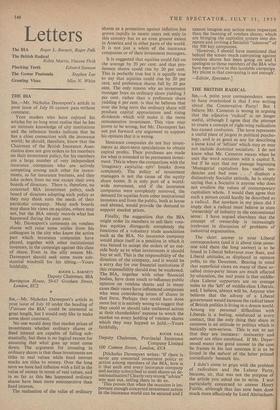SIR,-Mr. Nicholas Davenport's article in your issue of July 10
under the heading of `J'accuse the BIA' could be answered at great length, but I would only like to make some short comment.
No one would deny that market prices of investments whether ordinary shares or fixed interest are capable of falling sub- stantially, but there is no logical reason for assuming that what goes up must come down. The argument for investing in ordinary shares is that these investments are titles to real values while fixed interest stocks are titles to money. Over the long term we have had inflation with a fall in the value of money in terms of real values, and in so far as this has happened ordinary shares have been more remunerative than fixed interest.
The realisation of the value of ordinary shares as a protection against inflation has grown rapidly in recent years not only in this country but to an even greater extent in America and in other parts of the world. It is not just a whim of the insurance companies or of their investment managers.
It is suggested that equities could fall on the average by 20 per cent. and that pre- ference shares could rise by 20 per cent. This is perfectly true but it is equally true to say that equities could rise by 20 per cent. and preference shares fall by 20 per cent. The only reason why an investment manager buys an ordinary share yielding 3 per cent. rather than a preference share yielding 6 per cent. is that he believes that over the long term the ordinary share will produce capital appreciation and rising dividends which will make it the more remunerative investment. This view may prove to be wrong, but Mr. Davenport has not put forward any argument to support his opinion that it is wrong.
Insurance companies do not buy invest- ments as short-term speculations to obtain capital profits. Their purchases are made for what is intended to be permanent invest- ment. This is where the comparison with the `imaginary capitalist spiv' breaks down completely. The policy of investment managers is not the cause of the equity share boom. It is only part of a world- wide movement, and if the insurance companies were completely removed, the demand for equities from other institutional investors and from the public, both at home and abroad, would provide the demand to support market prices.
Finally, the suggestion that the BIA might order its members to sell their vote- less equities disregards completely the functions of a voluntary trade association such as the BIA. No insurance company would place itself in a position in which it was bound to accept the orders of an out- side body as to what investments it should buy or sell. This is the responsibility of the directors of the company, and it would be a sorry day for our financial institutions if this responsibility should ever be weakened. The BIA, together with other financial bodies, have done much to influence public opinion on voteless shares and in many cases their views have influenced companies who were considering issues of shares in that form. Perhaps they could have done more but it is entirely wrong to suggest that they could or should take unilateral action at their shareholders' expense to wreck the market on every holding of voteless shares which they may happed to hold.—Yours faithfully,
ROGER FALK Deputy Chairman, Provincial Insurance Company Limited 100 Cannon Street, London, EC4
[Nicholas Davenport writes: `If there is never any concerted investment policy or action among members of the BIA, how is it that each and every insurance company and society subscribed to steel shares on de- nationalisation? Clearly very strong "advice" was sent out, telling them to do so.
`This proves that when the occasion is im- portant enough concerted investment action in the insurance world can be secured and I cannot imagine any action more important than the banning of voteless shares, which are bringing the capitalist system into dis- repute and inviting a Socialist "takeover" of the 500 key companies.
'However, I should have mentioned that behind the scenes much canvassing against voteless shares has been going on and I apologise to those members of the BIA who have been active in this laudable campaign. My plaint is that canvassing is not enough'.
—Editor, Spectator.]






























 Previous page
Previous page